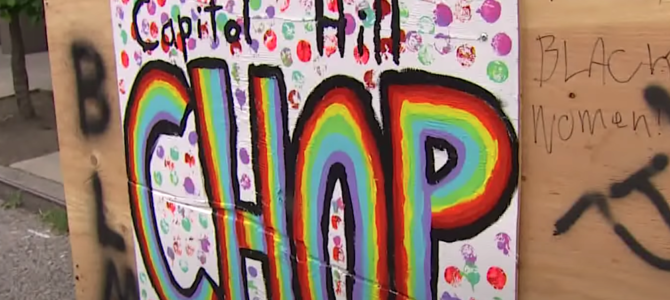Seattle’s elected leaders have allowed the city to descend into utter lawlessness and civic breakdown. After city leaders ordered police to evacuate a police station and abandon a six-block neighborhood to radical left-wing groups, those groups established the Capitol Hill Autonomous Zone (CHAZ), since relabeled an Occupied Protest (CHOP).
Meanwhile, Seattle leaders expect everyone else to behave responsibly, respect authorities, and follow the vast web of rules that regulate every aspect of city life. To Seattle leaders, one person robbing one store is a crime, but mass looting an entire shopping district is just a “protest.”
Conditions in CHOP continue to deteriorate. One man was killed and others seriously wounded in shootings since the no-police zone began.
Of course, it’s easy to accept civic violence when it is happening to someone else. The mayor of Olympia learned that dramatically when politically motivated property damage arrived on her own doorstep.
She had previously supported the protests and lamented her shortcomings, noting she “was not without sin” and that she needed to be “more welcoming and nurturing.” Her mood changed swiftly, however, when rioters vandalized her house, damaging the front door and porch with spray-painted political slogans. She likened the attack to “domestic terrorism,” adding, “It’s unfair.”
Journalist Chris Martin Palmer had a similar experience, cheerleading for burning buildings and looting in Minneapolis until rioters approached his neighborhood, at which point he angrily tweeted that protesters should “Go back to where you live.”
The ongoing disfunction in Seattle is representative of the breakdown of civility and peace in cities long governed by one-party rule. The last Republican mayor of Seattle was James Braman, elected in 1964. The last arguably centrist mayor was Wes Uhlman, who left office in 1978. Today the City Council is neatly divided into two camps, the left and the far left. The latter faction is aggressively led by avowed socialist Kshama Sawant.
Secure in the knowledge that voters have no real alternatives, the party in power naturally becomes increasingly radical as time passes. Interest groups become more strident in their demands. In Seattle’s case, key interests include powerful city unions, militant environmental activists, and oddly, the local bicycle club.
The result is that while looting, arson, and physical assault are forgiven, laws imposed on average families are strictly enforced. For example, failure to pay property taxes to the city in full and on time includes a 3 percent penalty on the first payment due, and an additional 8 percent penalty on the second payment, followed by foreclosure and confiscation. Parking, permitting, and red-light traffic camera rules are all strictly enforced. City officials threaten business owners who don’t follow rules with closure and loss of livelihood.
Civic life is not possible without widespread goodwill and cooperation from citizens. Seattle officials rely on voluntary compliance to govern, for everything from traffic rules, to remodeling permits, to taxes.
Yet the mayor and city are setting an example that rewards widespread cheating. Why should the average home or business owner live “by the book” when Seattle lets others break any law they like? People may reason, “Sure, I cheat on my taxes, but at least I didn’t set a police car on fire.”
If people follow the example of street activists and simply ignore rules they don’t like, the city will quickly be marked by commonplace fraud and deception. The mayor’s decision to allow mass lawlessness is so problematic for this reason.
Expecting people to obey the rules while accepting widespread lawbreaking cannot lead to respect, peace, or justice. The mayor calls it a summer of love, but she is really creating a culture of distrust in community life.
Only fair and firm administration, civic pride, and a sincere respect for order can make and keep Seattle a great place to live for everyone.








